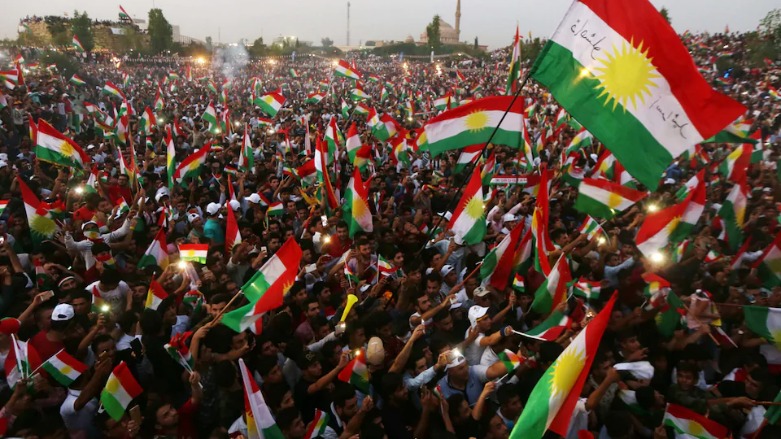Kurdistan marks fourth anniversary of independence referendum
“The referendum in 2017 had great symbolic power because it marked the beginning of an independence process that has not been broken to this day.”

ERBIL (Kurdistan 24) – The people of the Kurdistan Region on Saturday will mark the fourth anniversary of the region's historic referendum on independence, which saw an overwhelming majority vote in favor of statehood.
The referendum was spearheaded by the former President of the Kurdistan Region, Masoud Barzani, who is currently the president of the Kurdistan Democratic Party (KDP). On June 7, in a meeting chaired by Barzani, political parties in the Kurdistan Region decided to hold the referendum on Sep. 25, 2017.
The vote also included the disputed territories, which were under the control of the Kurdish Peshmerga forces after they drove ISIS terrorists out of the areas.
Despite pressure by regional states, Baghdad, the US, the UK, and the UN to postpone the vote as the date neared, the President of the Kurdistan Region decided to proceed. The “Yes” vote won by a landslide, with 92.73 percent favoring independence from Iraq.
In the book “Staking Our Claim” by KDP President Masoud Barzani, published last year, the Kurdish leader talks about the thinking behind going forward with the plebiscite and its aftermath.
Read More: President Masoud Barzani’s book, “Staking Our Claim”
“The constant refrain was that the Kurdish referendum was considered a threat to the security of the region and a potential trigger for war,” President Barzani wrote. “The reality proves otherwise; the call for independence represented a solution to the struggle of the Kurds rather than a risk to the cause, or a threat to its neighbors.”
“But ultimately, it gave Kurds the right to choose a better destiny rather than remaining with an unstable Iraq. We are proud of the Kurdish principles that promote tolerance and coexistence with other groups,” he concluded.
An independent state of Kurdistan has been the long-awaited aspiration of over 40 million stateless Kurds around the world.
Soon after the independence vote, in October 2017 Iraqi federal government launched a military attack with the help of Iran-backed armed groups to take over contested areas, including the oil-rich province of Kirkuk.
Baghdad also imposed sanctions on the Kurdistan Region, including an international flight ban on the Kurdistan Region’s airports.
The then prime minister of the Kurdistan Region, Nechirvan Barzani, eventually decided to freeze the results of the referendum as a way to initiate talks with Baghdad and lift the sanctions, but embargoes were in place for months.
In March 2018, Baghdad ended the flight ban and relations have since improved between the Kurdish and Iraqi governments.
Washington Kurdish Institute (WKI) head Sierwan Najmaldin Karim wrote in a piece marking the fourth anniversary of the referendum that “the Kurdish nation deserves a state, and Kurds should not give up on this goal.”
“The US and the International Community should learn from the past wrong policies and support Kurdish independence,” Karim added. The WKI president is the son of the late Dr. Najmaldin Karim, the former Governor of Kirkuk, who passed away last year,
Najmaldin Karim, who became the governor of Kirkuk province in 2011, was the last democratically-elected official to hold that position— from which he was ousted in the fall of 2017, following the attack on the disputed territory.
Read More: Dr. Najmaldin Karim remembered: ’Neurosurgeon from Maryland’ credited with bringing peace and normalcy to Kirkuk; played key role in starting US-Kurdish dialogue
Sierwan Najmaldin Karim added that the US must not repeat “such anti-Kurdish stances in the future, not only for their ethical obligations, but also for their national security interests.”
“The US had no alternative plans but to stand with Baghdad and turn a blind eye to the attack on Kurds by Iranians and their proxies.”
The influential Kurdish Community in Germany (KGD), which showed support for the referendum, also released a statement on the eve of the vote’s fourth anniversary.
“Today, four years later, the situation of the Kurds has unfortunately not changed much and the wish for a state of their own has not been fulfilled to this day.”
In October 2017, "an aggressive response, led by an Iraqi-Iranian initiative, was the reaction against the Kurdistan Region. Many homes of Kurdish civilians were put on fire and the population in and around Kirkuk were displaced," the organization added.
The KGD blamed Germany and the USA for allowing “themselves to be instrumentalized and rejected the referendum at the time for flimsy reasons, for example out of fear of a civil war and an alleged destabilization of the region.”
However, the KGD said that despite this the Kurds remain determined to continue their path.
“[Kurds] want to live in peace and good neighborly relations and decide their own fate. The referendum in 2017 had great symbolic power because it marked the beginning of an independence process that has not been broken to this day.”